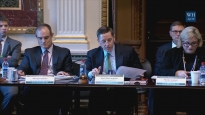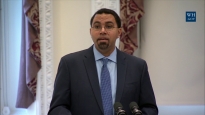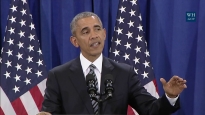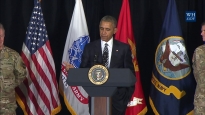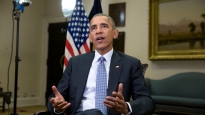Key Investments for Middle-Class Families
January 25, 2010 | 43:27 | Public Domain
President Obama and Vice President Biden address a meeting of the Middle Class Task Force and lay out a series of proposals and initiatives designed to create jobs, strengthen the economy, and ease the burden for middle-class families.
Remarks by the President and Vice President at Middle Class Task Force Meeting
11:47 A.M. EST
THE VICE PRESIDENT: Hey, folks. A year ago when President Obama established the Middle Class Task Force and asked me to chair it -- and I might add, we were only in office I think two days, Melody, when he set up this Middle Class Task Force -- because as we campaigned around the country, he made it clear that we were going to be sure that as we grew this economy, the middle class was not left behind as they had been the previous 10 to 12 years. And as we move from recession to recovery, our focus is the middle class.
Today -- today, living a quality middle class life starts, as it always has, with a good-paying job. And by job, we're not talking about merely a paycheck; it's more than a paycheck. And we're talking about dignity, we're talking about security. We're talking about knowing your pension is safe, your health insurance is reliable, your elderly parents and your children are going to be cared for, your neighborhood is safe, there's decent schools, and that your kids are going to be able to grow up and if they desire and you desire, be able to attend college. It's the old-fashioned notion of American Dream. I mean, it sounds corny, but that's literally what it is.
And the President -- and you and I -- have long believed that you can't have a strong America without a growing middle class. It's that simple. It's that basic. And right now, the middle class is nowhere near as strong as it needs to be.
So next month, the Middle Class Task Force is going to deliver its final report -- not final, its year-end report to the President. And this afternoon, we're spotlighting some of the items in that report that the President is going to be including in the upcoming budget. And these include, first of all, an expansion of the child tax credit. Since 2000, child care costs have grown significantly faster than inflation and twice as fast -- twice as fast as the median income of families with children. And that's why we're asking Congress to nearly double the credit for middle class families with incomes up to $85,000 and increase the credit for nearly every family making under $115,000.
Secondly, the President is going to be proposing an increase in funding for child care and -- the so-called Child Care and Development Fund to serve an additional 235,000 children in America. This is going to help working parents who are struggling to lift their families into the middle class.
And, thirdly, elder care. I mean, we all -- we're a generation -- the so-called baby boom generation is becoming very knowledgeable about elder care and the need to help middle class families who are caring for aging parents and relatives. People like Jill and me are part of what's called that "sandwich" generation. And I make a very good salary, but just going through caring for my mother the last year and a half, and before that, my father, who, thank God, lived to ripe old ages -- it was -- it's not easy. And I -- we sit there -- when my brother and sister and I -- brothers and sister and I divided up the cost of the care, we were able to do that, no complaints, not a problem. But I thought to myself, my lord, what would it be like -- a couple with two kids making $85,000 a year, even $125,000 a year? How do they do it?
So today we're proposing more support for caregivers by providing counseling, training, help with transportation, and temporary respite care when they just need a break or they have to work -- which most all of them do.
This is going to allow nearly 200,000 people who are now balancing work and providing care to an elderly relative to be served, and 3 million hours of respite care are going to be provided.
The fourth thing is we're going to be strengthening the income-based repayment program for student loans -- fancy way of saying a lot of kids and families graduate with significant loan responsibility and literally -- literally are left with very few options. They've got to go out and get the highest-paying job they can, maybe in an area they had no intention of working in, just to pay back the loan.
Today the average debt of a graduating senior from college -- now, listen -- the average debt -- people of my generation -- the average debt is $23,000. That is literally $2,000 more than my first house cost. But in any standard, it's a lot of money -- average debt. Some are graduating with a great deal more debt than that.
So our proposal ensures that Federal Student Loan payments for overburdened borrowers are never more than 10 percent of their income -- a change like that makes a real difference for a kid just out of school. For someone who earns 30,000 bucks and owes $20,000 in loans, this would lower his or her monthly
payment from $228 a month under the standard repayment plan to $115 a month. People who have to budget every day just to get by, they understand that's a big difference. That's a big difference.
And finally, we want to strengthen retirement security, which we talked about with the Secretary of Treasury, for American workers. Too many working people in this country don't have a good option to save their hard-earned money for retirement. And too many of those who do save are finding that at the end of the day they don't have enough saved to afford the basic retirement they deserve.
That's why we're proposing to give more workers better access to retirement plans at work, to match retirement savings for middle class Americans so they can save more, and to strengthen and update the 401(k) regulations so that they can save with greater confidence.
This means establishing an automatic individual retirement account. Today, 78 million Americans, working Americans --roughly half the workforce -- don't have employer-based retirement plans anymore. Our proposal lays the groundwork for an employer who do not currently offer retirement plans to enroll their employees in direct deposit IRAs. We found it's a simple proposition -- when you do that, people, if you're automatically enrolled, you can opt out. But they save a great deal more. And it just puts in place the requirement of the employer to provide that access out of their paycheck to go into an IRA. It's a simple proposition, but it's a big deal.
It also means simplifying and expanding the saver's credit, which helped working families save for retirement by providing a 50 percent match on the first $1,000 of retirement savings. So if you put a thousand bucks into a retirement account, your government is going to add even more -- another $500. It's an incentive, but long term it saves the government a lot more money than the 500 hundred bucks put in if in fact we find we have a generation that's able to care for themselves and not have to look to the government to provide some basic needs they need. This will not only help build up a nest egg for existing savers, but it's going to encourage workers who currently have no retirement accounts to start to save.
Taken together, these and other middle class proposals we believe will go a long way toward easing the strain on working families, allowing them to save more today to get further ahead tomorrow. Because if we give a working man and woman in this country -- and first of all, we make sure they've got good jobs -- if we give them an opportunity, they're the most productive workers in the world. We give them the tools, the flexibility, even just a chance to succeed, we're not only going to rebuild this economy, we're going to offer millions of Americans to build a future that they hope and still believe is available to them.
So I wanted to thank all you guys. You've been meeting with me on a regular basis. I've been a little bit of a pain in the neck. I know you have urgent, urgent, urgent things that were left on our plate -- placed on our plate when we took office. And one of the things you've done -- and I thank you for it -- when the President set up this task force is you have not taken your eye off the ball, you have serious people inside each of your agencies doing nothing every day but getting up, putting both feet on the floor, and saying, what are we going to do inside my shop that's going to ease the burden and increase the opportunity for people to get into the middle class and stay in.
So, Mr. President -- I think the President is here -- I'd like to invite him to come out because we owe the President a great deal for focusing this issue throughout the campaign and the first thing you did when you came to office. Mr. President, it's an honor working with you on this.
THE PRESIDENT: Thank you. Thank you, Joe. Hey, guys, everybody have a seat -- have a seat.
Well, I wanted to stop by to comment on all the great work that the Middle Class Task Force is doing. And you've just seen why Joe is the right person to do it. No one brings to the table the same combination of personal experience and substantive expertise. He's come a long way, and achieved incredible things along the ride, but he's never forgotten where he came from and his roots as a working-class kid from Scranton. He's devoted his life to making the American Dream a reality for everyone –- because he's lived it.
Now, we all know what that American Dream is. It's the idea that in America we can make of our lives what we will. It's the idea that if you work hard and live up to your responsibilities, you can get ahead -– and enjoy some of the basic guarantees in life: A good job that pays a good wage, health care that'll be there when you get sick, a secure retirement even if you're not rich, an education that will give our kids a better life than we had. They're very simple ideas. But they're the ideas that are at the heart of our middle class –- the middle class that made the 20th century the American Century.
Unfortunately, the middle class has been under assault for a long time. Too many Americans have known their own painful recessions long before any economist declared that there was a recession. We've just come through what was one of the most difficult decades the middle class has ever faced -– a decade in which median income fell and our economy lost about as many jobs as it gained.
For two years, Joe and I traveled this country and we heard stories that are all too familiar: stories of Americans barely able to stay afloat despite working harder and harder for less; premiums that were doubling, tuition fees that were rising almost as fast; savings being used up, retirements put off, dreams put on hold. That was all before the middle class got pounded by the full fury of the worst economic crisis since the Great Depression.
Their stories are why Joe and I ran for this office: to reverse those trends, to fight for the middle class, to make sure working families have a voice in the White House, and to do everything within our power to make sure they don't just survive the crisis, but again they can thrive.
And when we walked through these doors last year our first and most urgent task was to rescue our economy, to give immediate relief to those who were hurt by its downturn, but also to rebuild it on a new, stronger foundation for job creation. So we helped state and local governments keep cops and firefighters and teachers on the job, helping to plug their budgets. We invested in areas with the most potential for job growth both immediate and lasting –- in our infrastructure, in science and technology, in education, in clean energy. And these steps have saved or created about 2 million jobs so far.
But more than 7 million have been lost as a consequence of this recession –- an epidemic that demands our relentless and sustained response. Now, last month the House passed a new jobs bill. The Senate, as we speak, is hard at work developing its own job creation package. Creating good, sustainable jobs is the single most important thing we can do to rebuild the middle class -– and I won't rest until we're doing just that.
But we also need to reverse the overall erosion in middle class security so that when this economy does come back, working Americans are free to pursue their dreams again. There are a variety of immediate steps we can take to do just that -– steps we're poised to begin taking in the budget that I'll put forward next week.
Joe already spoke about some of these proposals in detail -– proposals that make it a bit easier for families to get by, for students to get ahead, and for workers to retire. To make balancing work and family more realistic, we'll make it easier to care for children and aging loved ones. To make college more affordable, we'll make it easier for students to pay back their loans, and forgive their debt earlier if they choose a career in public service. And to make retirement more secure, we're going to make it easier to save through the workplace.
Joe and I are going to keep on fighting for what matters to middle class families: An education that gives our kids a chance in life; new, clean energy economy that generates the good jobs of the future; meaningful financial reform that protect consumers; and health reform that prohibits the worst practices of the insurance industry and restores some stability and peace of mind for middle class families.
None of these steps alone will solve all the challenges facing the middle class. Joe understands that; so do I. So do all my members of the Cabinet and our economic team. But hopefully some of these steps will reestablish some of the security that's slipped away in recent years. Because in the end, that's how Joe and I measure progress -- not by how the markets are doing, but by how the American people are doing. It's about whether they see some progress in their own lives.
So we're going to keep fighting to rebuild our economy so that hard work is once again rewarded, wages and incomes are once again rising, and the middle class is once again growing. And above all, we're going to keep fighting to renew the American Dream and keep it alive -- not just in our time, but for all time.
So, again, to our team -- and that includes, by the way, the folks over here -- thank you for the great work that you've done. I'm excited about a lot of the proposals that you've come up with. And we expect that we're going to be able to get some of these critical initiatives passed soon so that folks can get some help right away.
Thank you very much. (Applause.)
END
12:05 P.M. EST
|
December 7, 2016
|
December 7, 2016
|
December 7, 2016
|
December 6, 2016
|
|
December 6, 2016
|
December 5, 2016
|
December 4, 2016
|
December 3, 2016
|
- &lsaquo previous
- …
- 3
- 4
- 5
- 6
- 7
- 8
- 9
- 10
- 11
- …
- next &rsaquo

